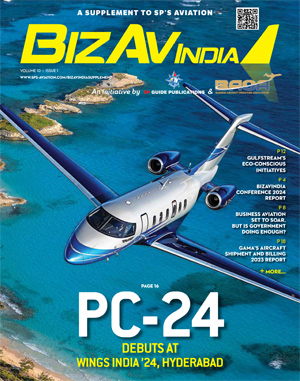Issues Affecting ‘Ease of Doing Aviation Business in India’
Besides ensuring inclusive economic growth, the small aircraft industry in NSOP/GA category in India provide critical services. It is important to let this vital industry grow.

India’s fast growing economy definitely needs every effort to be made to facilitate growth of NSOP/GA industry that provides the efficient means of doing business in a developed economy. Besides ensuring inclusive economic growth, the small aircraft industry in NSOP/GA category in India, provide medical emergency flights, pilgrimage flights and timely support during natural calamities, as was the case in Uttaranchal Pradesh three years ago. Following are the specific issues are required to be addressed immediately to let this vital industry grow and be ready to contribute to faster growth of the nation:
Security Clearance for all Director of the company from MHA
This remains a big concern for all new operators and the ones whose ‘AOC’ is due for renewal. The rationale and time-frame needs to be reviewed in contemporary environment. Issue of passport takes 3 days today, but Director’s security clearance takes 3 to 4 months and in some cases even up to one year. The whole process needs to made time-bound.
Isue of NOC for Aircraft Import
The process of issuing NOC and the allied requirements need to be rationalised. This process at MoCA/DGCA level takes 3-4 month, if not more. Alongside, the need to seek parking permission from airport operator further delays induction of aircraft. Parking permission is not required to be insisted upon for small aircraft of <20 seating capacity. These small aircraft can be parked at any airport based on real-time availability of parking and, DGCA’s approved SOPs at different airports to ensure no congestion is caused and safety not compromised.
Isue of FATA
This is another cumbersome process when a new type aircraft is introduced in India. This again should not take more than 7 days and initial FATA validity of foreign pilot should be one year. At present, it is a three step process including passing of Air Regulation examination and security clearance. Innovations in aviation industry begin at the level of small aircraft. Therefore, NSOP & GA industry will continue to import newly-introduced small aircraft in future as well. There is a need to simplify the process, as it is practised in US and Europe, to save time and money for operators who are required to pay heavily due to time taken to get Indian pilots reach level of proficiency on the new aircraft.
In view of the e-GCA programme, aimed at online regulatory clearances, getting unduly delayed, e-filing should be immediately started in DGCA to help monitor movement of files
AOR at Defence Airfields
Many defence airfields are regularly used for civil flights, where permission, in the form of AOR is required for NSOP/GA aircraft. There is need to review this very requirement of AOR, as well as the existing time-frame of 30 days advance notice for restricted defence airfields.
YA permission to fly abroad
The rationale of seeking permission to fly abroad for Indian NSOP/GA operators is not understood. The real-time information on each international flight is available with FIRs in India, where Air Force Liaison Units (AFLU) are co-located to address all requirement of Air Defence Clearance (ADC) given by Indian Air Forces. DGCA, as a safety regulator of the state, now meets its obligation for foreign flights of NSOP by means of endorsing ‘ops specifications’ on CoR of the aircraft. This YA Number requirement should be immediately withdrawn for Indian registered NSOP.
E-Governance for all clearance related to BA/GA
In view of the e-GCA programme, aimed at online regulatory clearances, getting unduly delayed, e-filing should be immediately started in DGCA to help monitor movement of files. This would provide intermediate respite to NSOP/GA operator before e-GCA finally comes through.
Proportionate Regulations
DGCA needs to diligently work on ensuring all modes of public air transportation like airlines, SCA, NSOP have common but differentiated (based on AUW, Size, Type of Operation, Pax Capacity, Area of Operation) financial and safety regulations to facilitate efficient operations and maximising use of costly aircraft inventory.
MRO Approvals
The existing norms of MRO approval need to be reviewed. Instant approval for OEM/FAA/EASA approved facilities to be given based on ‘Table Top’ exercise. Physical inspection to be insisted only when genuine doubts exist and the same decided at the level of DG/JDG.
External Commercial Barrowings
Norms of external commercial barrowing to be eased to allow BA/GA/MRO industry seek loans at 1 to 5 per cent interest from foreign lending institutes.
Trade Free Zone at Metro Airports/MRO Hubs
Create ‘trade free zones’ at metros and other MRO hubs to facilitate MRO business and optimise India’s potential to be a MRO hub in the region. This would allow green channel clearance of all spares to reduce ‘turn around time’ for MRO services.
Review Civil Aircraft import being in negative list
Rationale of civil aircraft import being in the “negative list” needs to be reviewed. While government clearance may be a requirement for NSOP, private owner should be exempted. In the same way, security clearance of directors for a private aircraft owner needs relook. This was not required till a few years ago.
Relaxing RBI norm Involving NSOP/GA aircraft import
While RBI has eased certain norms for transfer of funds for aircraft import in the recent past, there is still scope to ensure that this process is simplified further to allow payment of advance. The system of issuing Letter of Type Acceptance (LOTA) by DGCA, before remittance of advance for purchase of new ‘first of type’ aircraft model, needs to be immediately reviewed. LOTA should be mandated while granting final approval to import aircraft in the country instead of being asked at the time of applying for initial approval for import/acquisition of the aircraft.





